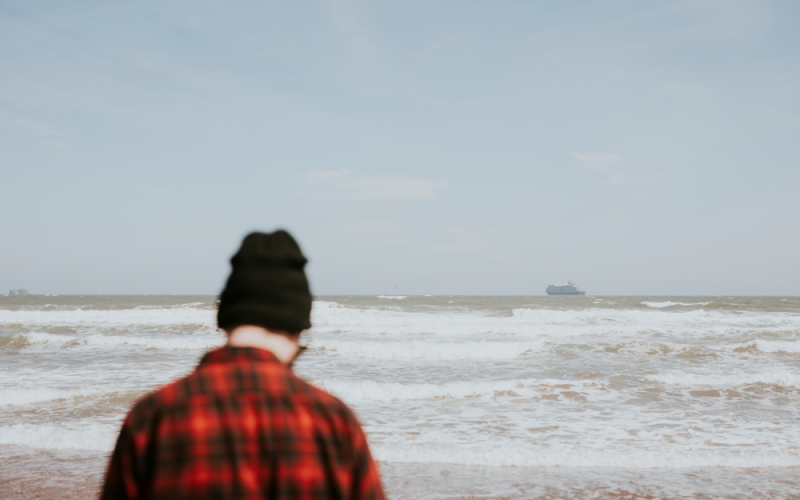The aura associated with the concept of the Lone Fisherman has been expressed in art and on social media, reinforcing the reputation of commercial fishermen as solitary, strong individuals. That aura is more reality than myth, but the mental cost of it has only recently become better understood. Studies show that in the United States, suicide rates for a group of professionals that includes commercial fishermen are more than double the national average workplace fatalities.
Specifically in Massachusetts, workers in the forestry, hunting, and agriculture industries (which includes commercial fishing) are more likely than the average worker to be prescribed opioids to manage work-related pain and injuries and about five times more likely to die of opioid-related causes. The commercial fishing industry across the country echoes the struggle of opioid addiction and the connection to mental health issues, and with a younger generation of fishermen entering the workforce, this is something industry professionals must not ignore.
Stress has always been a factor in the commercial fishing industry, with fishermen facing unique stressors that are not always present in other industries. These stressors can include finances, finding a competent crew, weather, boat problems, lack of sleep, chronic pain, or trauma. A 2019 article mentioned that commercial fishing is the most dangerous civilian job in the U.S., with 100 deaths per 100,000 workers. It is an isolating, dangerous occupation full of uncertainty and expenses.
How are fishermen dealing with all these issues on a day-to-day basis? What does it mean to identify these distinct stressors, to acknowledge a traumatic event, or to recognize the signs of a crisis on your boat?
These are some of the key questions that will be addressed during the Mental Health for commercial fishermen: Strategies for addressing stress on the water session at Pacific Marine Expo. While many of these issues have been known and understood for years, only recently has the awareness of how they could and need to be dealt with arise.
One of the panelists for the session Denise Damewood, founder of Project Gabe, a resource for harm reduction; providing opioid misuse awareness, education, and recovery tools. Damewood is a public health nurse in Sitka and created Project Gabe in honor of her son Gabe Johnston, who passed away from an opioid overdose in January 2022.
“Our waters are full of strong men and women working long hours in physically demanding situations," Damewood told National Fisherman. "When our bodies are pushed past our limits, fatigue and pain cannot be ignored for long. This is when it is acceptable for society to seek help from medical providers that may prescribe opioids. If opioids become a part of treatment or if left untreated and pain leads to self-medication and polysubstance misuse, an overdose is not only possible but, unfortunately, plausible. It is important to put aside old stigmas regarding 'druggie addictions' and 'mental health weaknesses' and realize the strong do get hurt and can become addicted to harmful substances like everyone else.”
In addition to the tractional stresses of the job, today’s fishermen also must deal with the uncertainty of climate change on fisheries, pandemics, inflation, rising political tensions, and fish management decisions. It can prove difficult to face all these challenges while being isolated in high-stress environments with limited access to physical or mental health resources.
A panel of experts, including Damewood will explore this topic as part of the Free Education Program at Pacific Marine Expo in November. It will also include Jeff Farvour, and Marissa Baker, Ph.D. Farvour is a Southeast longliner and troller of the F/V Apollo. Farvour is Vice President of the Alaska Longliner Fishermen’s Association and is part of the advisory panel for the North Pacific Fishery Management Council, while Baker is an assistant professor and Industrial Hygiene Program Director at the University of Washington.
These three industry professionals will explore and answer questions while also providing insights when it comes to stress management methods while on the water and back on shore. They will also identify the symptoms of stress overload, when you should reach out for help, and provide resources that are available for short and long-term stress factors, substance abuse, immediate crisis, etc.
All of these issues are ones that fishermen across the country deal with on a regular basis, and not addressing them can be a liability that impacts them on and off the water.
"Though you are surrounded by your like-minded co-workers, addiction can make you feel even more separated and isolated," Damewood continued. "As fishermen and women, you are no stranger to hard work in demanding situations and inclement weather. This is when you are known to dig deep and “embrace the suck” of the situation, knowing the payoff is around the corner. But would you notice if your buddy was in habitual pain or self-medicating that pain?”
Generations of fishermen have indirectly dealt with mental health challenges, but a new generation wants and needs to see these issues explored in a much more direct manner. Join the conversation and learn how you can participate in the panel to help get fishermen of all eras on the path of positive mental health & wellness while also learning about specific tools and methods that can alleviate and address stressors.
Learn more about the Mental Health for commercial fishermen: Strategies for addressing stress on the water session.
You can also discover all the sessions that define the 2023 PME Free Education Program.






